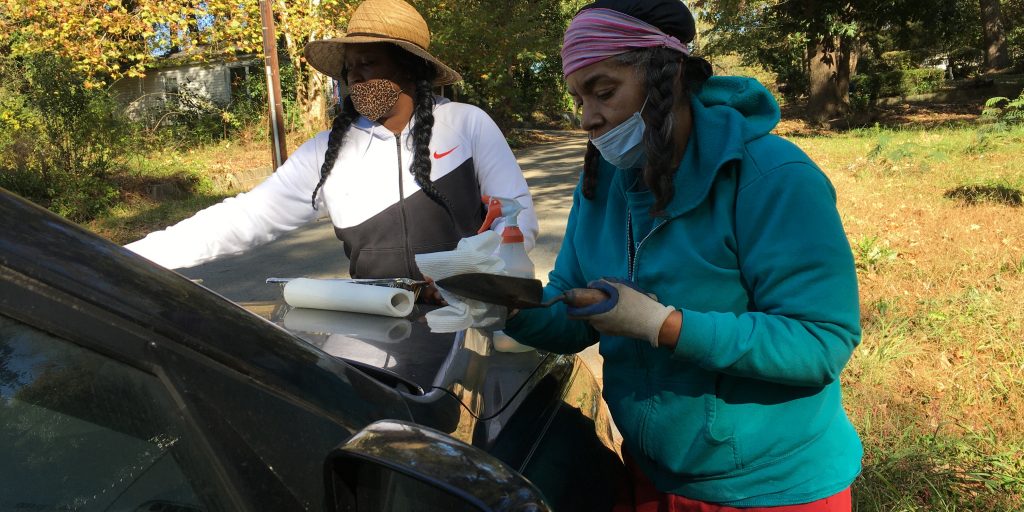WABE’s Week In Review: Georgia Politics On The National Stage
On the Week in Review for Nov. 7-14, we continue our look at the role Georgia is playing on the national stage.
Secretary of State Brad Raffensperger announced on Wednesday that the state would conduct an audit of the Presidential votes. The move meant nearly 5 million ballots would have to be hand-counted.
“We follow the process, and we understand the significance of this race for not just Georgia, but for every single American,” said Raffensperger. “At the end of the day, when we do a hand count, we can answer the question, exactly what was the final margin in this race.”

The ballot audit of the Presidential race specifically is because the race is so close in the state and not because of political pressure, according to Raffensperger.
The Republican Secretary of State has come under fire from his own party for baseless allegations of fraud during the election. In fact, the two Republican U.S. Senate candidates, Sen. Kelley Loeffler and Sen. David Perdue, released a joint statement calling for his resignation.
Raffensperger issued his own statement saying that he was unhappy President Donald Trump did not win the election, but he would not resign. A day after Perdue and Loeffler’s statement and calls from other prominent Republicans, including the state party, to resign, Raffensperger called for the audit of the ballots.
“Far be it from me to explain Republican strategy because it’s mindboggling this kind of ‘eat your own’ strategy,” said Democrat Cathy Cox, who served two terms as Georgia’s secretary of state.
Under Georgia law, the state gets to pick which race will be the subject of what’s known as a risk-limiting audit. A process designed to ensure the state’s new election system has counted ballots correctly.
Counties in Georgia have until 11:59 p.m. on Nov. 18 to turn in their counts. The deadline for the state to certify is Nov. 20.
More election drama, and this one matters more…

Georgia’s 16 electoral votes do not appear to matter much anymore to the overall tally of the Presidential race. President-elect Joe Biden has a commanding electoral vote count. Of course, it does matter that the state voted for a Democrat for President for the first time since 1992. It speaks to the changing landscape in the state, and as Georgia has 16 electoral votes, one of the highest in the country, the state could be a must-win in the future.
Georgia is also already getting a lot of attention and will get much more over the coming weeks for both its U.S. Senate races, which are in a Jan. 5 runoff. The state is the only one in the country with runoffs for the general election. The reason likely goes back to a contentious 1966 governor’s race.
There have only been two U.S. Senate runoffs in Georgia’s history, and Republicans won both. The GOP was able to bring more turnout for the 1992 and 2008 Senate runoffs.
But things could be different this time as there are now two high-profile races that could determine the majority in the U.S. Senate, and one of the candidates is Raphael Warnock.
“We have an African American candidate competing,” said University of Georgia political scientist Charles Bullock. “Now the drop off in 2008 among Black voters was higher than among white voters, well maybe that won’t be the case.”
And Republicans also have to heal from the bitter infighting that happened during the primary between Loeffler and Doug Collins, according to Bullock.
A coming of age election for thousands of Georgia teens…
An estimated 23,000 teenagers in Georgia who were too young to vote in the Nov. 3 general election will turn 18 in time to participate in the Jan. 5 runoff races for Georgia’s two U.S. Senate seats, according to The Civics Center, a nonprofit that promotes youth civic engagement.
With the state’s tight margins and the fate of Senate control in Georgia voters’ hands, there is a chance that a good share of the incoming campaign funding and attention will be directed toward these new voters. The deadline to register is Dec. 7, and 17-year-olds with a birthday before Jan. 5 are eligible.
Teachers get creative to engage kids at home…
Atlanta Public Schools will continue with remote learning through the rest of 2020. That means students will spend the first half of the 2020-21 school year online. That’s caused teachers to try to come up with creative ways to keep their kids engaged.
Digging for lead in the backyard…

Last year, high levels of lead were found in English Avenue, a largely Black and low-income Atlanta neighborhood. The U.S. Environmental Protection Agency has gotten involved and is conducting more testing and removing polluted soil from people’s yards and gardens.
Concern over that contamination has sparked a project to test soil across the state.
The initiative allows Georgians to check their yards for free and is led by Emory University and public health agencies. The deadline to send in soil samples is Sunday.








